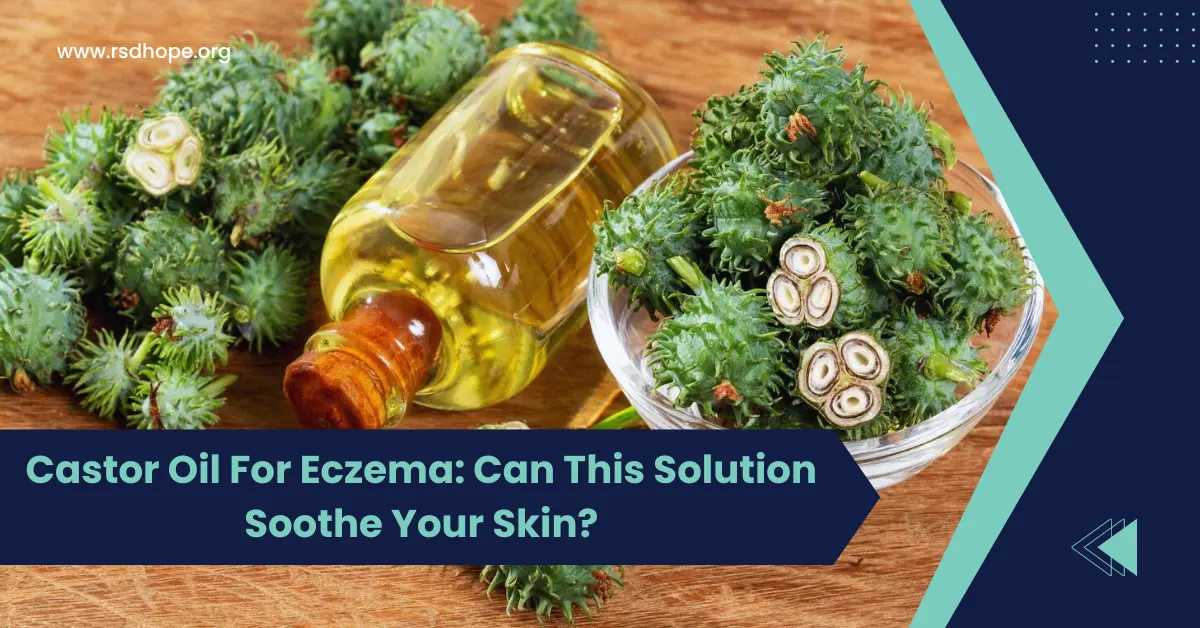Eczema, a chronic skin condition characterized by red, itchy, and inflamed patches, affects millions of people worldwide. While conventional treatments like corticosteroids can provide relief, many individuals are turning to natural remedies for a gentler approach. One such remedy gaining attention is castor oil, a vegetable oil derived from the seeds of the castor plant (Ricinus communis). In this article, we’ll explore how to use castor oil for eczema and its potential benefits for the skin.
Key Takeaways
- Castor oil’s anti-inflammatory and moisturizing properties may help soothe eczema symptoms.
- Scientific studies and anecdotal evidence support the use of castor oil for eczema.
- Proper application and patch testing are essential to minimize potential risks and ensure effectiveness.
What is Castor Oil?
Castor oil is a pale yellow, viscous liquid extracted from the seeds of the castor plant. It is composed primarily of ricinoleic acid, a unique fatty acid with anti-inflammatory and antimicrobial properties. Castor oil has been used for centuries in traditional medicine for various ailments, including skin conditions, digestive issues, and pain relief.
Also Read: Cumin Seed Benefits For Skin
Effectiveness of Castor Oil for Eczema
Several scientific studies have investigated the potential benefits of castor oil for eczema. A 2015 study published in the Journal of Evidence-Based Complementary & Alternative Medicine found that a cream containing castor oil effectively reduced eczema symptoms, including itching, redness, and scaling. The study attributed these benefits to castor oil’s anti-inflammatory and moisturizing properties, which can help soothe irritated skin and promote healing.
Anecdotal evidence also supports the use of castor oil for eczema. Many individuals with eczema have reported significant improvements in their symptoms after applying castor oil topically. They describe reduced itching, redness, and flaking, as well as improved skin hydration and overall appearance.
How to Use Castor Oil for Eczema?
To use castor oil for eczema, follow these simple steps:
- Cleanse the affected area with a gentle, fragrance-free cleanser and pat dry.
- Apply a small amount of pure, cold-pressed castor oil to the eczema patches, gently massaging it into the skin.
- For added benefits, mix castor oil with other soothing ingredients like coconut oil or aloe vera gel.
- Leave the oil on for at least 30 minutes, or overnight for maximum absorption.
- Repeat the process once or twice daily, or as needed, to manage eczema symptoms.
Castor oil can also be added to bathwater or applied as a compress for a more immersive treatment. Simply soak a clean cloth in warm castor oil and apply it to the affected areas for 15-20 minutes.
Other Benefits of Castor Oil
Beyond its potential benefits for eczema, castor oil may also help with other skin concerns. Its antimicrobial and anti-inflammatory properties make it a popular choice for treating acne, reducing the appearance of scars and stretch marks, and promoting overall skin health. Castor oil is also believed to strengthen hair and nails when applied topically or consumed in small amounts.
Potential Risks of Castor Oil for Eczema
While castor oil is generally considered safe for topical use, some individuals may experience allergic reactions or skin irritation. To minimize the risk of adverse effects, always conduct a patch test on a small area of skin before applying castor oil to larger areas. If you notice any redness, itching, or swelling, discontinue use immediately.
It’s also important to consult with a healthcare professional before using castor oil, especially if you have pre-existing medical conditions or are taking medications. Pregnant women should avoid consuming castor oil orally, as it may stimulate uterine contractions.
Conclusion
Castor oil’s anti-inflammatory and moisturizing properties make it a promising natural remedy for eczema. While scientific studies and anecdotal evidence support its use, individual responses may vary. If you’re considering using castor oil for eczema, be sure to conduct a patch test and consult with a healthcare professional to ensure safety and effectiveness. With proper use and guidance, castor oil may offer a gentle, natural approach to managing eczema symptoms and promoting healthier, more comfortable skin.
Read More: Spearmint Tea For Acne: A Natural Remedy For Clear Skin
FAQs
A: Castor oil may be beneficial for various types of eczema, including atopic dermatitis, contact dermatitis, and seborrheic dermatitis. However, it’s always best to consult with a dermatologist to determine the most suitable treatment for your specific type of eczema.
A: The time it takes to see results may vary from person to person. Some individuals report improvements in their eczema symptoms within a few days of using castor oil, while others may require several weeks of consistent use to notice significant changes.
A: Castor oil is generally considered safe for use on children with eczema, but it’s crucial to consult with a pediatrician or dermatologist before applying it to a child’s skin. They can provide guidance on the appropriate amount and frequency of use based on the child’s age and severity of eczema.
A: It’s essential to consult with your healthcare provider before combining castor oil with prescription eczema medications. While castor oil is generally safe, it may interact with certain medications or alter their effectiveness. Your healthcare provider can advise you on the best approach to integrating castor oil into your eczema treatment plan.
Sources:

